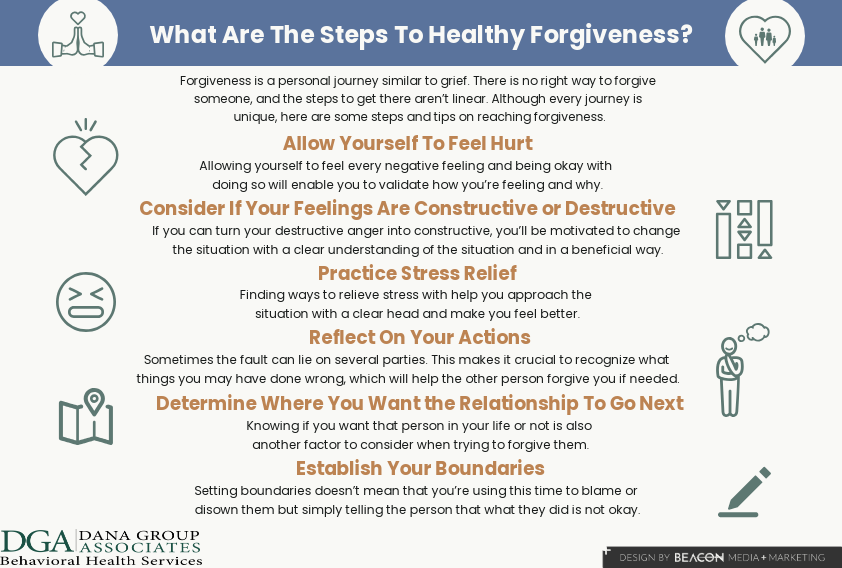Forgiveness can be a difficult thing to accomplish. It takes a having a personal drive to forgive and allowing yourself the needed time to get there. However, once you can forgive someone, you’ll feel peace of mind and as if a weight has been lifted off your shoulders.
Many people may want to forgive someone but don’t know where to start. Like the grief process, it’s a personal journey with no right way, but you can follow a few common steps.
Getting to the point of forgiveness will also benefit your mental health and help you heal from the situation that hurt you. If you’re struggling to forgive someone, here are a few ways to move towards forgiveness and how that can benefit you.
Are you interested in getting help with forgiveness? Contact Dana-Group Associates today to learn how we can help you!
What Does Forgiveness Look Like?
Forgiveness goes beyond telling someone that we forgive them. The act of forgiving someone comes from within and is most reflected in your emotions, thoughts, and actions toward that person.
If showing forgiveness isn’t simply telling someone “It’s okay,” then what does it look like? Forgiving someone means moving on from the negative feelings, such as anger and resentment, that often build up with someone hurt you. It also means you are choosing not to retaliate or seek revenge for what they did. True forgiveness means that you’re ready to let go of those emotions and are ready to heal and find freedom from the suffering. It’s accepting that you were hurt, letting go of the want to feel right or justified, and mending the brokenness within.
It’s important to know that forgiving someone doesn’t mean that what they did was okay. And while sometimes forgiveness means you are ready to move on to the next stage of your relationship, forgiving someone does not mean you’re obligated to stay. If someone is untrustworthy or toxic, it’s completely up to you if you feel you should remove yourself from the relationship.
If you do choose to reconcile with the person your hurt, with forgiveness, your relationship can take the next step in a healthy direction. It’s important that the situation is acknowledged and a clear direction on where to go next is established. You may not go back to the way things were before, but you will be on a new path to what your relationship will be.
Why Is Forgiveness Important For Your Mental Health?
Holding on to negative feelings can drastically impact your mental health and lead to a decline in your overall health. With forgiveness, you’ll be able to let go of any emotions that are weighing you down.
Unforgiveness, resentment, and anger can hurt how you interact with the world. It can begin to push people away from you and result in poorer mental health, such as depression or anxiety.
By allowing yourself to forgive them, you’ll release any negative feelings that are holding you back. The situation that caused the problem can also heavily weigh on your mind. But with forgiveness, you can come to peace with the past and heal from the deep hurt you experienced.
Research published in the Journal of Religion and Health found that participants who practice forgiveness experienced more positive emotions, better relationships, and more spiritual growth. They felt empowered and had a greater sense of meaning and purpose in their life.

What Are The Steps To Forgiveness?
Forgiveness is a personal journey. There is no right way to forgive someone, and the steps to get there aren’t linear. Many people can skip over these steps, and some may also have to go backward in their path.
Although every journey is unique, here are some steps and tips on reaching forgiveness.
1) Allow Yourself To Feel Hurt
Many people try to push away any negative feelings that they may have. However, doing so will hurt you in the long run. Pushing them away will cause them to reappear later and may be worse than before.
Allowing yourself to feel every negative feeling and being okay with doing so will enable you to validate how you’re feeling and why. This is the first step towards forgiveness because you allow yourself to cope with and accept the situation.
2) Consider If Your Feelings Are Constructive or Destructive
If you’re feeling constructive anger, you feel motivated to respond to the situation appropriately. In other words, you’re angry but are trying to use those strong feelings to practice self-awareness, build self-respect, and heal.
However, destructive anger can force you to act irrationally because you’re trying to find a way to cope with the situation. Forgiveness doesn’t entail looking for revenge or being spiteful, and struggling to manage your anger can cause you backlash and tear others down, including other people who may be trying to help, and can cause you more pain in the long run
Do you want help identifying your feelings? Schedule an appointment with us so we can work through them together.
3) Practice Stress Relief
Thinking about the situation that hurt you can make you feel stressed, especially if you’re not sure what the future might hold. Trying to figure out the next steps of where to go with your relationship can be overwhelming. Finding ways to cope with these feelings and relieve your stress can help you approach the situation with a clear head and make progress toward forgiveness.
4) Reflect On Your Actions
It can be easy and quick to blame someone else for the whole situation. However, sometimes the fault can lie on several parties. This makes it crucial to recognize what things you may have done wrong, which will help the other person forgive you if needed.
Sometimes it’s hard to understand what you could’ve done wrong, so asking the other involved parties can help you see if you’re also at fault for the situation. It is important to address that someone manipulating your actions as the reason behind theirs is not healthy. So, it’s essential to recognize the difference between wrong actions and someone blaming you for their actions, better known as gaslighting.
5) Determine Where You Want the Relationship To Go Next
Knowing if you want that person in your life or not is also another factor to consider. If this person has caused too much pain over a long period, it may be time to let the relationship go, as that may be more beneficial to your mental health.
However, if you still want them in your life, this is a good step to remember why you want them around. This can help you remember the priorities of your relationship and feel gratitude for those factors again. It would help if you also used empathy or sympathy to help in your path of forgiveness so you can keep them in your life.
6) Establish Your Boundaries
If you decide that you want the person in your life, setting up boundaries is a good idea. These can be gentle reminders that can help set things in order.
Setting boundaries doesn’t mean that you’re using this time to blame or disown them. Rather, boundaries in place to support your healing and protect your emotional needs. If someone has hurt you in the past, you need to be able to communicate your discomfort, say no, and ask for space when you need.
How Counseling Can Help You With Forgiveness
Reaching the point of forgiveness can be challenging. If someone has hurt you deeply, you can’t simply push the pain away. Healing can take a long time and takes work. Choosing not to retaliate takes a great deal of emotional regulation.
If you are consumed by feelings of hurt, resentment, depression, or anxiety from being hurt by someone you cared about, you may need professional help getting to a place of forgiveness. This include helping you talk through your pain, learning new coping mechanisms, and progressing toward a place of healing.
Counseling can also help with the process of reconciliation if that’s the path you choose. A therapist can mediate the discussion and identify what each person needs to heal and move on, which can include looking at the past, reestablishing trust, or setting boundaries.
At Dana-Group Associates, we offer individual, couple, and family therapy to help move you towards forgiveness. With our help, you can reach a state of forgiveness that will leave your mental health better and you more optimistic for the future.
Want to know more about how we can help you reach forgiveness? Schedule an appointment with us.
